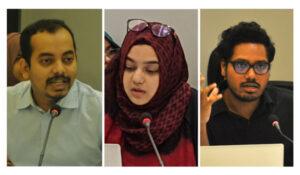
As a part of the regular capacity-building initiatives of the Centre for Policy Dialogue (CPD), the in-house session of the 60th Young Scholar Seminar Series (YSSS) was organised by CPD on 10 August 2023. Mr Mashfiq Ahasan Hridoy, Research Associate, CPD, Ms Marium Binte Islam, Research Associate, CPD and Mr Mohammad Abu Tayeb Taki, Research Associate, CPD, presented their research papers at the session. Dr Fahmida Khatun, Executive Director, CPD, chaired the session.
The YSSS is a capacity building programme of the CPD aimed at helping young professionals to improve their research, analytical, articulation, and presentation skills. The YSSS program has been in place at the CPD since 2006, and it includes in-house discussions where young researchers can present their ongoing research and receive feedback from their peers.
Mr Mashfiq Ahasan Hridoy presented his paper on ‘Renewable Energy Policy (Draft) 2022: A Comprehensive Analysis’. In his paper he conducted a comprehensive review of the Renewable Energy Policy (Draft) 2022 and highlighted key features of the new policy. He compared the 2008 and 2022 draft policies, analysed their alignment with other relevant plans/acts, and presented findings in a matrix. The study also examined renewable energy policies in India and Vietnam, outlining their distinctive features. Additionally, the paper explored international endeavours to discourage fossil fuels within renewable energy policies. This approach provided insights into the new RE Policy’s significance, alignment with other frameworks, and global trends in renewable energy.
Ms Helen Mashiyat Preoty, Research Associate, CPD, provided an assessment of the paper. Her input suggested that a more pronounced focus on the transmission and distribution of renewable energy from the grid could have enhanced the paper’s scope and depth.
The study on ‘Policy Reform for the Rohingya Refugees: Turning Burden into Blessing’ was presented by Ms Marium Binte Islam. The objective of the study was to analyse the cross-border displacement policies of Bangladesh, assess their prospects and limitations, and recommend new policies accordingly. Her paper suggested that implementing long-term, persistent policies centred around education, employment opportunities, and safety for cross-border displaced individuals could yield a positive impact on Bangladesh. She also suggested that it is necessary to empower the government financially, given that the government fears the burden of the cross-border displaced individuals may impact the economy.
While assessing this paper, Ms Nadia Nawrin, Research Associate, CPD, said that linking the executed policies to classical liberalisation and realism theories adds an intriguing layer of analysis, enriching the study’s depth by bridging tangible policies with overarching philosophical and political viewpoints. However, this approach might not entirely encompass the intricacies of the Rohingya Crisis.
Mr Mohammad Abu Tayeb Taki presented his paper on ‘Why Such Resilience towards Mechanisation? A Case Study on Bangladesh’s Agricultural Sector’. The paper aimed to explore how the traditional agricultural sector in Bangladesh can be modernised through agricultural mechanisation. He recommended improving machinery access at the rural level, supporting the Custom Hiring Service (CHS) market with subsidies, educating farmers about mechanisation benefits, and allocating resources for agricultural research and innovation.
Research Associate, Ms Najeeba Mohammed Altaf, suggested that including gender dynamics in the analysis would have significantly enhanced the value of the study. Additionally, she highlighted the crucial role that financing access for such machinery plays in the mechanisation process for farmers.
In order to provide guidance to young researchers, Dr Fahmida Khatun, emphasised the importance of aligning the study’s recommendations with its findings, urging the researchers to ensure a cohesive connection between the two. She recommended the thorough formulation of research questions prior to commencing any study. This can be achieved by reviewing existing literature to identify gaps. By doing so, a clear and focused research question can be crafted, resulting in precise recommendations.
Distinguished Fellow, Dr Debapriya Bhattacharya, advised the researchers to improve their presentation skills. He emphasised that the presenters should prepare a time management strategy and ensure that they are covering all the important aspects of the paper within the given time. While presenting a paper, it is essential for a researcher to prioritise delivering clear messages, limiting these messages to precise key points.
Mr Towfiqul Islam Khan, Senior Research Fellow, recommended that the study titles should accurately reflect the content of the research. He suggested to clearly define the objectives of the study and emphasised the importance of using accurate terminology and language. Furthermore, he also advised against allowing the recommendations to exhibit any perceived researcher bias.
Research Fellows, Research Associates, Programme Associates, and Interns of CPD, were also present at the session, many of whom participated in an open floor discussion and shared their valuable insights.

